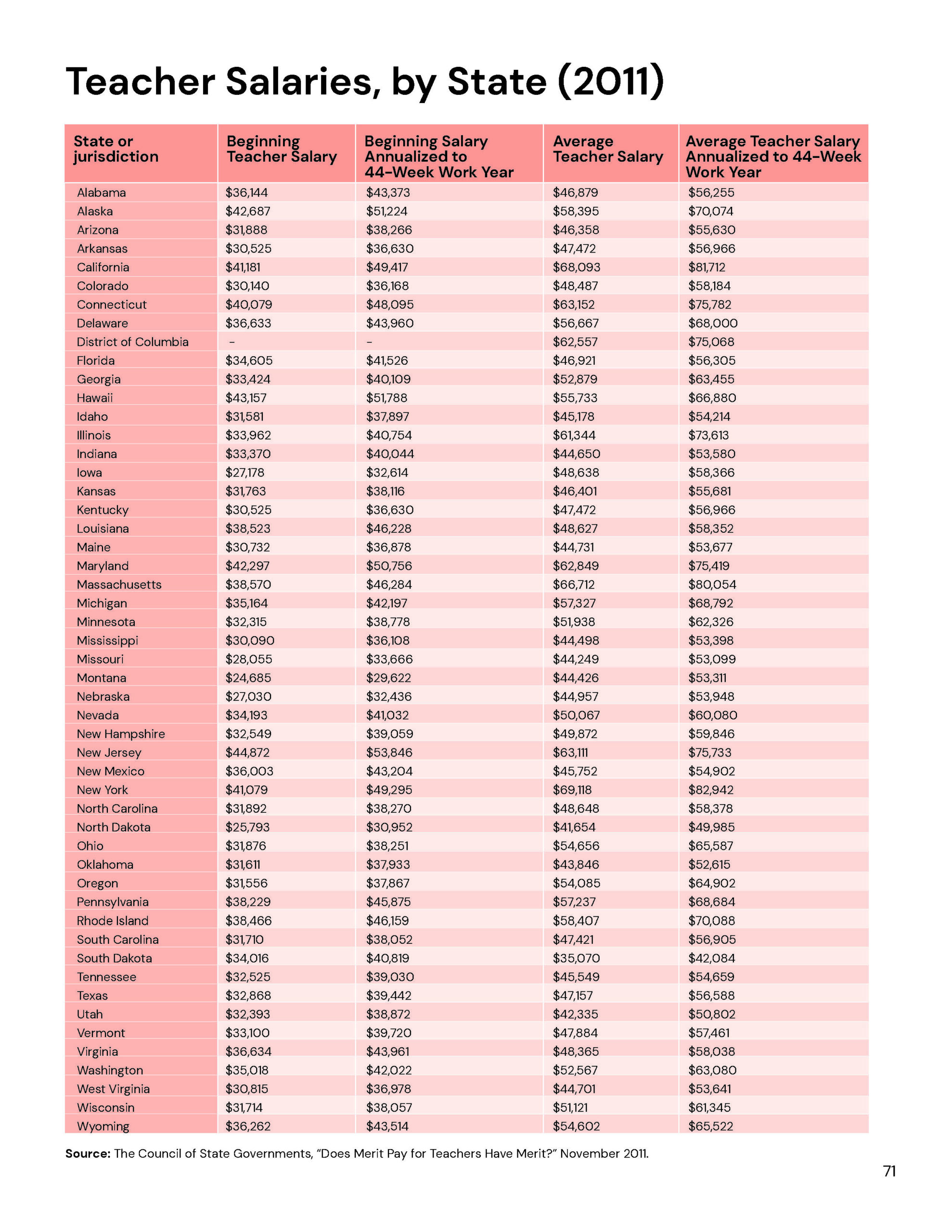Teacher Merit Pay
Nevada lawmakers first experimented with performance pay for teachers in 2005, when they implemented a small pilot program at $5 million per year. Funding for the modest program was eliminated during the 2007-2009 budget cycle.1
Landmark legislation in 2011 created the Teachers and Leaders Council of Nevada to develop a statewide framework for evaluating teacher performance using multiple measures. Parallel legislation instructed local school districts to implement a performance-pay system beginning with the 2014-2015 school year.2
One major drawback with the 2011 laws, however, is that the structure of any new performance-pay system will be subject to collective bargaining negotiations within each school district. Union leaders representing teachers have long opposed the concept of true performance pay and generally seek to neuter any real changes by making teachers broadly eligible to receive modest bonuses with “performance” or “merit” in the title.3 Research shows that these diluted forms of merit pay are ineffective at improving student outcomes. In 2015, additional fears came to fruition when lawmakers actually reduced the significance of student achievement as a component of teacher evaluations.4
Key Points
No school-controlled factor has a greater impact on student achievement than teacher quality. As former President Barack Obama said, “From the moment students enter a school, the most important factor in their success is not the color of their skin or the income of their parents, it’s the person standing at the front of the classroom.”5 Volumes of research confirm that improving teacher quality is the best, most cost-effective method schools can use for elevating student performance.6
Current teacher compensation schemes are not attractive to the most talented professionals. Annualized to a standard, 44-week work year, entry-level pay for teachers in Nevada is comparable to entry-level pay in many other professions. Inflexible teacher-pay schedules, however, make the earning potential of the most talented teachers not competitive with what they could achieve in other fields.7
Teacher compensation is not aligned with the factors that influence student achievement. Pay schedules currently reward Nevada teachers for many activities that have little impact on student performance, such as pursuit of advanced degrees in non-technical fields. Strong evidence suggests that an exclusive system of performance pay – awarded only to the top 5-% of educators – can dramatically improve student performance.8
Recommendations
Implement longitudinal data tracking system. Legislation passed in 2011 instructed the Nevada Department of Education to design and implement a data-tracking system for the 2013-14 school year. Implementation of this system was repeatedly delayed and lawmakers suspended its use for teacher evaluations in 2021.9
Reward the top 10% of teachers with $200,000 in total compensation. Along with former Nevada Superintendent of Public Instruction and UC-Berkeley education scholar James Guthrie, Nevada Policy has designed an exclusive performance-pay system that would lure into Nevada classrooms the world’s best educators. In exchange for working in at-risk schools and spending part of the summer training other teachers, the top 10% of Nevada teachers would be acknowledged as “master teachers” and receive total compensation packages of $200,000. The revenue-neutral program is realized by diverting funding currently spent on less cost-effective programs, such as class-size reduction. Legislation heard in 2015 would have implemented this proposal.10

1 Nevada Legislature, Legislative Counsel Bureau, “Research Brief on Teacher Pay-for –Performance Plans,” September 2012.
2 Ibid.
3 See, e.g., Stephen Sawchuck, “Duncan Presses NEA on Merit Pay, Tenure,” Education Week, July 2, 2009.
4 Nevada Legislature, 78th Session, Assembly Bill 447.
5 The White House, “Remarks by the President to the Hispanic Chamber of Commerce,” March 10, 2009.
6 See, e.g., Eric Hanushek and Steve Rivkin, “Teacher Quality.” In Handbook of the Economics of Education (2007), Vol. 2, Ch. 18., pp. 267-327.
7 James Guthrie, “The $200,000-a-Year Classroom Teacher,” NPRI Policy Study, April 2013.
8 David Figlio and Lawrence Kenny, “Individual Teacher Incentives and Student Performance,” NBER Working Paper 12627, October 2006.
9 Nevada Legislature, 81st Session, Assembly Bill 57.
10 Nevada Legislature, 78th Session, Assembly Bill 378, As Introduced.
